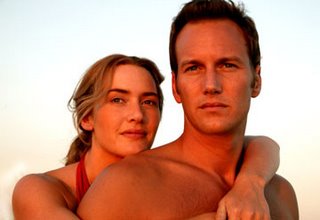Little Children

There is a scene in Little Children where Sarah Pierce (Kate Winslet) describes to a skeptical book club audience why she loved the novel “Madame Bovary.” A tale of tragedy, bravery, stupidity, passion and wickedness, there’s hardly an element of the book that doesn’t find its way onto the screen in these characters’ lives. Sarah isn’t stupid—she sees the parallels. But for the first time in her life she thinks she’s happy, thinks she’s in love. While she knows the tragedy must be right around the corner, for now she’s happy with the bravery and passion.
Little Children is a flawed film. That said, I liked it; at times, even loved it.
I was entranced by the surreal first act. Director Todd Field’s (the magnificent In the Bedroom) direction and Antonio Calvache’s cinematography is so gorgeous, so fluent that you can’t help but be held spellbound. It’s the second act where the film goes long and astray, trying, though not really succeeding in connecting the various plot elements. But by the third act, it seems to remember its earlier glory and brings everything back together in a way that almost makes you question the second act’s inadequacies altogether.
The first thing you notice about Little Children is Will Lyman. You won’t find Lyman’s name in the credits nor will you see him in the film, but he is nonetheless everywhere. Lyman, the well-known voice behind PBS’s Frontline and NOVA, narrates the film, not as a character but as the sort of third-person omnipotent observer rarely, if ever, seen in modern filmmaking. There is a rule in screenwriting: show, don’t tell. Little Children does both and it works flawlessly. Lyman’s rich voice makes us think we are watching a nature special about animals caught in the act in their native habitat.
Exactly.
The native habitat here is not the Sahara, but the idyllic suburbia of Massachusetts. Suburbia is the favorite, overused target of filmmakers these days, not that there isn’t plenty of fodder there to work with. Additionally, the film confronts another all-too common, thirty-something question: why do otherwise fascinating and appealing adults lose all semblance of interest and dynamism when they begin having children?
The animals in this nature film are comprised of a stay-at-home narcissistic father who can’t seem to pass the bar exam and gets high on the adulation of women other than his knockout wife, the languishing academic who has traded the flexing of her mind for folding laundry and changing diapers, the ex-cop whose lost the only thing he ever knew how to be and in the process is on the verge of becoming the very criminal he used to put away, and the sexual deviant so desperate to be normal he will do to himself what others claim so boldly they wish to do.
These adults are the little children to which the title refers. They spend the entire film in various states of juvenile immaturity, only grasping hold of their mantles of responsibility in the closing moments. Better late than never, we are told; it’s never too late to start acting like a grown up. The film ends with hope. There will be a lot of hard work ahead, but despite their flaws, you come to care for each of these characters and want the best for them--even the sex offender.
Based on Tom Perrotta's 2001 novel (Perrotta also wrote the screenplay), Little Children is about as close as a movie can get to literature—rich, nuanced, erudite and multi-layered. The film, like the book, treads a fine line between tragic satire and disquieting, uncomfortable reality, creating a world in which judgmental looks, hidden secrets, repressed desires, and deep, dark fantasies are barely kept at bay by a flimsy social order. What is perhaps most surprising of all is the realization that Little Children is a comedy—a dark, blistering comedy, but a comedy nonetheless.
Little Children is far from flawless, but it remains one of this year’s most beautiful and thought-provoking films. (And it has what just may be the best trailer--click above--I’ve ever seen).


0 Comments:
Post a Comment
<< Home